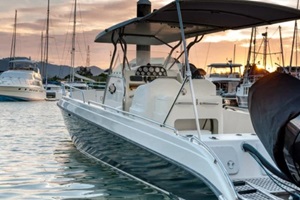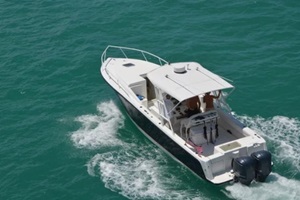 Eco-tourism is booming in Rhode Island. Operators provide visitors with incredible opportunities to experience the Ocean State’s diverse marine habitats and wildlife up close.
Eco-tourism is booming in Rhode Island. Operators provide visitors with incredible opportunities to experience the Ocean State’s diverse marine habitats and wildlife up close.
However, with the growing popularity of eco-tours comes increased responsibility for environmental protection and stewardship. Even minor oil spills or debris from vessels can damage sensitive ecosystems and lead to major fines and clean-up costs.
That’s why you must understand your liability risks, implement responsible boating practices from the start, and protect yourself with boat insurance in RI.
Understanding Potential Environmental Liabilities
When running boat tours, you face a range of potential environmental hazards, including the following.
Oil and Chemical Spills
Accidental releases of fuel, oil, or cleaning agents into the water can be incredibly damaging. Even small spills have the potential to coat wildlife, contaminate habitats, and wash up on beaches.
Operators are liable for containment and clean-up under state and federal laws. Related fines can reach hundreds of thousands of dollars depending on spill volume and toxicity.
Sewage Discharges
Dumping boat sewage overboard can spread bacteria and nutrients that contribute to algal blooms and dead zones.
All vessels with installed toilets must have Marine Sanitation Devices (MSDs) to treat or store sewage. Discharging untreated sewage within 3 miles of shore violates Clean Water Act regulations and results in steep fines.
Garbage/Litter
Trash and fishing gear discarded from boats contribute to marine debris. Such debris can entangle or be ingested by wildlife, leading to injury and death. Both deliberate and accidental littering from your vessel may violate anti-dumping laws.
Habitat/Wildlife Disturbance
Irresponsible operation too close to shorelines or marine wildlife can damage sensitive habitats such as eelgrass beds and coral reefs. Repeated motor noise can cause animals to abandon nesting areas.
Harassing marine mammals and endangered species carries potential fines and jail time.
Rhode Island Regulations and Requirements
To legally operate in RI waters, your vessel must comply with US Coast Guard and state boating/environmental rules, including:
- Federal Water Pollution Control Act: Prohibits discharging oil or hazardous substances into navigable waters. Violations carry fines up to $250,000 and imprisonment.
- Rhode Island Oil Spill Pollution Control & Prevention Act: Requires immediate clean-up of any spilled oil/petroleum. Failure to contain spills as best as possible can result in significant penalties.
- RI Clean Marina Program: Voluntary certification with extensive best practices for handling and disposing of vessel-related pollution. This program is highly recommended for eco-tour operators.
In addition, vessels over 300 gross tons must carry a federal Certificate of Financial Responsibility (COFR), guaranteeing your ability to pay spill clean-up costs up to your liability limits.
Most boat insurance in RI policies do not cover COFR certificates, so check with your underwriter.
The Role of Boat Insurance in Rhode Island for Environmental Liability Coverage
To fully protect yourself from the fines and damages outlined above, partner with a marine insurance provider that offers robust environmental liability coverage. Look for a policy that includes:
- Coverage for containment, clean-up, and mitigation costs related to fuel spills or other discharges from your vessel
- Third-party liability coverage for any damage to private property or natural resources
- Civil penalties and legal fees
- Optional coverage for criminal fines/penalties
Keep in mind even a basic boat insurance policy may cover some clean-up expenses, but this is often subject to your liability limits.
Investing in dedicated pollution coverage with higher limits ensures you won’t foot the bill for a worst-case spill or violation. Discuss options with a qualified Rhode Island boat insurance agent.
Implementing Responsible Boating Practices
Of course, the best way to avoid environmental incidents is prevention. Eco-tour companies that are serious about sustainability should implement thorough staff training, vessel maintenance protocols, and responsible boating practices covering the following:
Staff Education
Set a strong foundation for environmental responsibility by implementing robust training for your staff covering key areas such as:
 Educating personnel on responsible viewing of marine wildlife and protecting sensitive habitats.
Educating personnel on responsible viewing of marine wildlife and protecting sensitive habitats.- Instructing captains and crew on best practices for fueling, waste disposal, and emissions control.
- Conducting safety briefings and maintaining logs showing who attended them.
Fueling and Maintenance
Minimize the risks from fuel handling and engine issues by consistently adhering to protocols such as:
- Using oil absorption pads when fueling to catch any drips or spills.
- Sorting and properly disposing of hazardous wastes.
- Inspecting engine seals, gaskets, and lines for leaks and fixing these issues promptly.
- Relying on mechanics to tune engines for maximum fuel efficiency.
Sewage Handling
Responsibly manage your vessel’s discharges and waste by:
- Installing holding tanks if they aren’t already required.
- Using pump-out facilities to get rid of sewage properly.
- Checking that marine sanitation devices are functioning optimally.
On-Board Procedures
Promote sustainability during tours via strict on-board policies, including:
- Providing covered trash receptacles and recycling what you can.
- Never discharging or disposing of anything overboard.
- Reporting spills or sheens immediately and initiating a prompt response.
- Keeping spill response plans and clean-up materials on board.
Let JMG Insurance Agency Help You Achieve True Sustainability While Protecting Your Business
It’s clear sustainable tourism relies on healthy oceans. Consequently, as boat tour operators, you are responsible for being ocean guardians.
Understanding and planning for your environmental risks, securing marine coverage that takes things such as spills seriously, and putting everyday best practices into action are the types of moves that let you keep running tours responsibly while also going the extra mile to nurture Rhode Island’s vibrant marine life.
JMG Insurance Agency is here to help in your eco-tourism endeavors. Let’s work together to make sure you’ve got protection that gives you peace of mind.
Contact us today at 1-844-304-7332 or online so you can focus on smooth sailing while preserving the beauty of the Ocean State.




